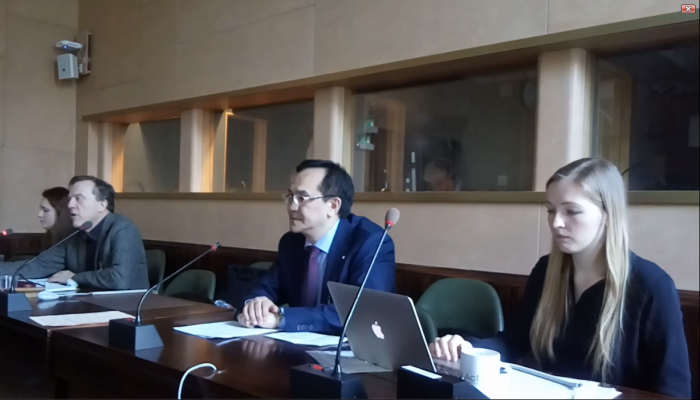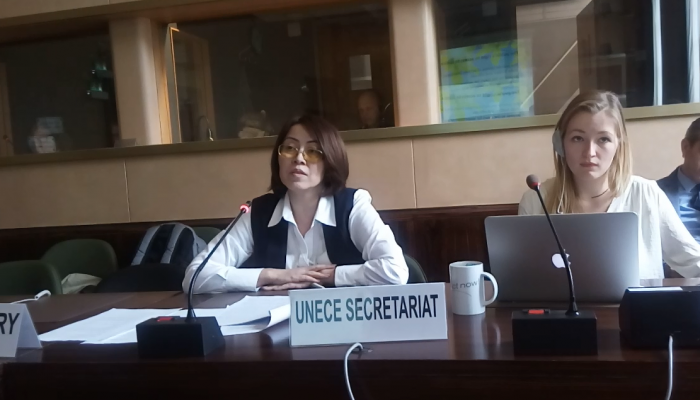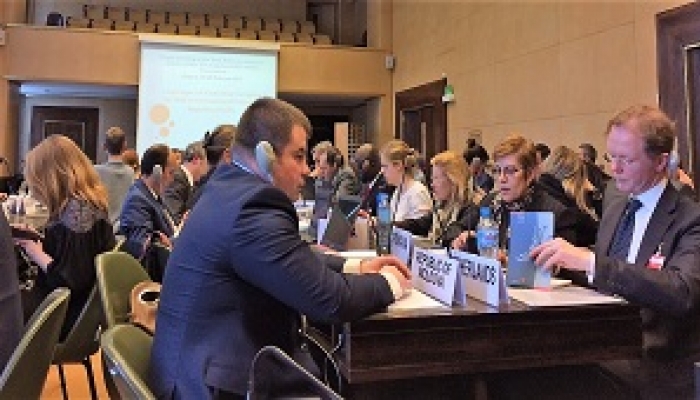Tue, 03/28/2017 - 10:01
The judge of the Supreme Court of Kazakhstan, Beibut Shermukhametov, took part in the meeting of the 10th Meeting of the ‘Task Force on Access to Justice under the Convention on Access to Information, Public Participation in the Adoption Process decisions and access to justice in environmental matters ", held on February 27-28, 2017 in the Palace of Nations (Geneva, Switzerland).
Over 60 judges, government officials and judicial systems, representatives of universities, NGOs and public environmental organizations from 20 countries took part in the forum was. They considered the issues of procedural legal capacity to protect the violated right or public interest in challenging the decisions of state bodies relating to the environment, the difference in judicial supervision of decisions of state bodies in accordance with paragraphs 2 and 3 of Article 9 of the Aarhus Convention, the courts' right to change decisions of state bodies on the merits and the availability of remedies.
UN Special Rapporteur Michel Forst (France) reported that over the past two years, about 100 environmentalists, including human rights defender Bertha from Honduras and her two colleagues have died in the countries of South America, South East Asia. They fought against the uncontrolled deforestation of the rainforests, which could lead to an ecological catastrophe and the death of thousands of people. She herself received threats of reprisal, she was accused of terrorism, pogroms, but the authorities did not take measures to stop these illegal actions.
Patrick Dietz (EU Commission) reported on the application of the judicial precedent in Eastern Europe on environmental disputes, in particular, on the example of the courts of Slovakia. Gordana Petkovic (Department of the Ministry of Agriculture and Environmental Protection, Serbia) reported on the fight against corruption in the field of environmental protection.
Chloe Gambin (Environmental Protection Agency, Malta) said that the Internet resources of the country's courts are connected online to the Pan-European portal "Digital Justice". Judges in real time receive information about the legal system, laws, changes in the legislation of countries connected to the portal. The courts employees can help the parties correctly draw up documents in Maltese, English and other languages.
According to Viktor Kamenkov (Belarus), the matter of mediation application in cases of appealing against decisions, actions (inaction) of public authorities, officials is widely discussed in the country. He noted that this could reduce the burden on the courts and expand the legal field of mediation.
B.Shermukhametov reported on significant changes in the jurisprudence on environmental disputes in civil proceedings, the adoption by the Supreme Court of Kazakhstan on this issue of legal regulation. Thus, many problems of the application of environmental legislation were removed, judicial interpretation was given to the norms of law, issues of responsibility for committing environmental violations were settled. The judge gave an example of the application of Article 9 of the Aarhus Convention directly to the Supreme Court (on the complaint of the NGO "Green Salvation" on the recognition of an unauthentic response by the Ecology Department of Almaty for the issuance of an environmental permit).
In the course of the meeting, its participants heard reports from a group of international experts on the state of access to justice in the framework of the implementation of the Aarhus Convention in Central and Eastern Europe, Central Asia and Kazakhstan. The experts accepted the remark of the Kazakhstan judge that they used obsolete data in the reports for 2016.
It is noted that, unlike Kazakhstan in many European countries (without taking into account the Russian Federation, Belarus, Ukraine and Moldova), one of the main problems remains the legal capacity of non-governmental organizations (NGOs) and the possibility to participate in court as officers of the court in civil cases on environmental disputes. For example, each NGO, in addition to investing its activities in the appropriate legal form, must prove its legal interest in an environmental dispute. Judge of the city of Lunburg, Thomas Schomerus (Germany) cited two examples when local courts allowed NGOs to participate in court and confirmed their right to file legal claims on widening the riverbed on the river Wasser and wind generators in Lower Saxony.
It is noteworthy that the chairman of the meeting Jan Darpö (Sweden) noted that Kazakhstan has made significant progress in developing access to justice and applying the norms of the Aarhus Convention.
The experience of Kazakhstan will be recommended to the countries-participants of the Convention.




